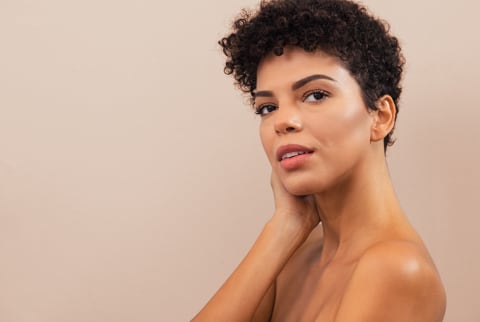Advertisement
What Is Chebula & Why Are We Seeing It Pop Up In Ingredient Lists?


When it comes to skin care ingredients that encourage healthy aging, antioxidants live at the forefront—and for a very good reason. They help your skin combat free radicals that can damage skin cells and lead to fine lines, age spots, and an overall crepey appearance.
Vitamin C is one of the most sought-after antioxidants at the moment (both topically and in supplements), but another potent plant extract is coming for its crown. Used in Ayurvedic medicine for centuries, this botanical not only has the ability to encourage healthy skin aging but also may help reduce redness and irritation. Let us introduce chebula oil.
What is chebula?
The chebula oil you may see popping up in skin care ingredient lists is extracted from Terminalia chebula, which is a tree native to South Asia. There are many different species of the Terminalia tree, all of which have historically been used in Ayurvedic medicine as a sacred ingredient for countless remedies, including asthma, heart concerns, urinary tract infections, and so much more.
The reason Terminalia, specifically Terminalia chebula, has been used for so many centuries is because of its powerful anti-inflammatory and antioxidant properties1. These properties make it a great proponent for treating inflammatory skin concerns and encouraging healthy aging in the skin.
Skin care benefits.
Thanks to these anti-inflammatory and antioxidant properties, there's some significant research demonstrating chebula's efficacy in the skin:
- Calms irritation: One study found that chebula oil was effective in easing psoriasis symptoms2, which typically manifests as red, itchy, and scaly patches on the body and face. Another study showed that using extracts from the chebula tree can accelerate wound healing.
- Combats dark spots & fine lines: Another study showed that using extracts from the chebula tree can combat photodamage and skin aging. That's because the potent antioxidant neutralizes free radicals, which cause oxidative stress3 and ultimately skin aging—think fine lines, wrinkles, and overall damage of skin cells.
- Brightens skin: Antioxidant-rich ingredients are great for brightening up skin appearance, and chebula can help secure your glow. According to one study, chebula extract showed an overall positive rejuvenating effect on the skin4.
- Retains antioxidant power: What's more, chebula is what's known as a "cascading antioxidant," meaning instead of losing its efficacy in the skin shortly after being applied, it retains its potency throughout the day (meaning it keeps working to fight off free radicals). This is why chebula oil is perfect for a leave-on serum or moisturizer rather than a wash-off product.
Where to find chebula products.
Again, chebula has a long history of use in Ayurvedic medicine, and you can find it in a variety of skin care formulas. However, there aren't too many products that use chebula as the main active ingredient, as it was only recently deemed safe for topical use via a water-based extraction process—right now, we love the True Botanicals Chebula Active Serum. "Chebula is one of the most bioactive antioxidants that I have ever encountered, so the minute that we discovered it, we knew that it should be a central new active ingredient for our line," Hillary Peterson, the founder of True Botanicals, tells mbg.
Not to mention, this serum is packed with a load of antioxidant ingredients, including elderberry, green tea, echinacea, and ginger. Perhaps one of the most popular hydrating ingredients, hyaluronic acid, makes it into the mix as well, working alongside aloe vera extract to restore the skin barrier and give your skin an immediate "plump" effect.
Who should use chebula?
Generally, chebula is universally tolerable: "Chebula is as gentle as it is effective, and it is suitable for all skin types," Peterson says. "Importantly, oxidative stress is at the root of all skin challenges, from acne to [fine lines], so adding such a stable and effective bioactive antioxidant to your routine makes a big difference."
We do always recommend a patch test, though, just in case you face an allergic reaction to any ingredients. This is important for everyone but particularly true if you have sensitive and easily irritated skin.
How to add it to your routine.
Now that you've learned what chebula oil is, why it works, and where to buy it, let's talk about how to add it to your daily routine.
Since this is an active ingredient, you'll want to pat it on dry skin right after cleaning (rather than humectants, which do their best work on damp skin). You can use chebula in the morning and evening (or both) but generally, derms recommend you use antioxidants in the morning. "I like my antioxidants in the daytime because there is some evidence to suggest they can work with sunscreen to impart environmental protection," board-certified dermatologist Elizabeth Tanzi, M.D., associate professor of dermatology at George Washington University Medical Center, told us about using vitamin C serums.
Plus, if you are partial to nighttime exfoliators or retinoids, you won't layer the two right on top of each other (which can render them ineffective or lead to irritation for some). Also remember to follow up with your favorite moisturizer or oil. On that note, if you want to add even more chebula to your skin care routine, or if you already have a favorite serum, True Botanicals also has a Chebula Extreme Cream you can use as a daily moisturizer.
The takeaway.
It's always exciting to see natural ingredients that have been used for centuries popping up on the market, and chebula oil is no exception. Chebula's powerful antioxidant and anti-inflammatory properties make it a great addition to your skin care routine, working to fight off free radicals that can lead to signs of aging. If you want to double-up your body's defense against free radicals, antioxidants are found in countless beauty supplements as well—just in case you want support from the inside out.
